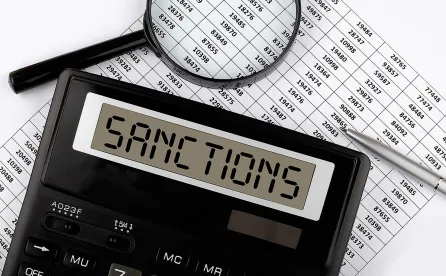On Feb. 24, 2022, President Biden announced significant new export controls and sanctions against Russia in response to the Russian invasion of Ukraine. The latest sanctions package comes on the heels of a first wave of U.S. sanctions announced over the past several days, and combines financial restrictions implemented by the U.S. Department of the Treasury’s Office of Foreign Assets Control (OFAC) and significant new export controls implemented by the U.S. Department of Commerce’s Bureau of Industry and Security (BIS).
Second Wave of Sanctions
In his speech on Feb. 24, 2022, President Biden announced a second wave of sanctions designed to seriously impact Russia’s financial sector and access to capital. These measures follow an initial sanctions package announced on Feb. 22, 2022, which was targeted at the so-called Donetsk People’s Republic and the Luhansk People’s Republic (collectively, the Covered Regions) as well as the sanctions relating to Nord Stream 2 issued Feb. 23, 2022. In conjunction with President Biden’s announcement, OFAC implemented the following additional sanctions measures:
-
Cut off Sberbank, Russia’s largest financial institution, from the U.S. financial system by prohibiting correspondent and payable-through accounts);
-
Designated several other Russian financial institutions as Specially Designated Nationals (SDNs) – including Russia’s second-largest financial institution, VTB Bank – rendering their U.S. assets blocked and prohibiting U.S. persons from engaging in virtually all dealings with them;
-
Restricted U.S. person dealings in new debt and equity of over a dozen significant Russian enterprises and entities; and
-
Designated several Russian and Belarusian individuals and entities as SDNs (which, as noted above, freezes their assets and prevents virtually all U.S. person dealings).
Issuance of Russia-Related General Licenses
On Feb. 24, 2022, in conjunction with the sanctions measures described above, OFAC issued a number of Russia-related General Licenses permitting certain types of limited activities by U.S. persons in or with Covered Regions or with sanctioned entities or individuals, including temporarily permitting certain activities to divest, transfer or wind down impacted holdings.
-
General License No. 5 authorizes activities of specifically identified international organizations and entities.
-
General License No. 6 authorizes specific exports or re-exportation of medicine, medical devices, agricultural commodities to, and certain COVID-19-related transactions involving the Covered Regions.
-
General License No. 7 authorizes overflight payments, emergency landings, and air ambulance services.
-
General License No. 8 authorizes certain limited energy-sector related transactions.
-
General License No. 9 temporarily authorizes transactions related to divestment or transfer of certain debt or equity.
-
General License No. 10 temporarily authorizes certain transactions related to the wind down of derivative contracts.
-
General License No. 11 temporarily authorizes transactions ordinarily incident and essential to the wind-down of transactions involving the blocked parties set out in this license through March 26, 2022 (12:01 a.m. EST).
-
General License No. 12 authorizes U.S. persons to reject transactions involving one or more of the following: (1) Public Joint Stock Company Bank Financial Corporation Otkritie; (2) Sovcombank Open Joint Stock Company; (3) VTB Bank Public Joint Stock Company; or (4) any entity in which one or more of the abovementioned parties owns, directly or indirectly, individually or in the aggregate, a 50% or greater interest.
Historic Export Control Restrictions on U.S. Items and Technology to Russia
Concurrent with the announcement of new OFAC sanctions, BIS issued an amendment to the Export Administration Regulations (“EAR”) effective Feb. 24, 2022, implementing the sanctions against Russia. The export controls package will severely restrict Russia’s access to U.S. technologies and other commodities. The controls are largely directed at Russia’s defense, aerospace, and maritime sectors, and are designed to limit Russia’s access to the essential technological inputs and undermine Russia’s strategic ambitions to exert its influence globally.
The export control measures:
-
Impose new export licensing requirements on a broad range of products, software, and technology when destined for Russia;
-
Add two new Foreign Direct Product (FDP) rules specific to Russia and Russian “military end users”;
-
Specify a policy of denial for license applications for exports, re-exports to, or transfers within Russia;
-
Expand existing Russia “military end use” and “military end user” control scope to all items subject to the EAR;
-
Significantly restrict the use of EAR license exceptions for exports, re-exports, and in-country transfers destined for Russia;
-
Redesignate 45 Russian entities from the Military End-User (MEU) List to the Entity List, resulting in more stringent broad license requirements on exports, reexports and in-country retransfers of all products subject to the EAR, including foreign-produced products subject to Russia-MEU FDP rules; and
-
add two new Russian entities to the Entity List and “military end user” designations to two Russian entities already found in the Entity List.
CCL Items Subject to Licensing Requirements
Perhaps the most significant aspect of the above measures is the imposition of license requirements for all Export Control Classification Numbers (ECCNs) in Categories 3 through 9 of the Commerce Control list (CCL). Categories 3 through 9 of the CCL include electronics, computers, telecommunications and information security, sensors and lasers, navigation and avionics, marine, and aerospace and propulsion. Certain license exceptions, as well as exports of EAR99 products without a license, remain authorized. However, the change means a majority of dual-use products subject to the EAR will now require export licenses to Russia. When combined with BIS’s policy of denial of license applications for exports to Russia, this will significantly impact Russia’s ability to source U.S.-origin goods.
Key Takeaways
As a result of the dynamic security and legal situation in the region, all companies and organizations engaged in activities involving Russia, Ukraine, and Belarus should quickly assess the nature and type of activities, nationalities of personnel involved in those activities (for example, U.S. and EU citizens are required to comply with the sanctions laws regardless of where they reside), and the steps necessary to wind down those activities if they cannot permissibly continue under the current sanctions measures. Additionally, in light of the severe U.S. export controls effective immediately, companies assessing their activities in the region should also consider what items (goods, software, and technology) are exported, reexported, or retransferred to or in Russia—and take internal compliance measures to prevent unauthorized and even inadvertent exports of controlled items to Russia.
It is vital now more than ever for companies that export or reexport goods, products, or software to Russia, to ensure they have classified all of the abovementioned commodities under U.S. export controls regulations to determine whether the measures trigger new export licensing requirements.
Given the fluid situation of the Russia-Ukraine conflict, companies and organizations should continue to closely monitor communications/guidance from BIS, the Department of the Treasury’s Office of Foreign Assets Control, and the White House. As the conflict escalates, President Biden and other leaders have indicated a willingness to escalate sanctions in response.
The latest U.S. measures are part of a multilateral sanctions response that includes measures already announced or currently considered by the UK, EU, Canada, Australia, Japan, and others. Given the overlapping but distinct sanctions regimes at play, companies and organizations with dealings in the region should carefully consider the sanctions measures of all applicable jurisdictions.





 />i
/>i

